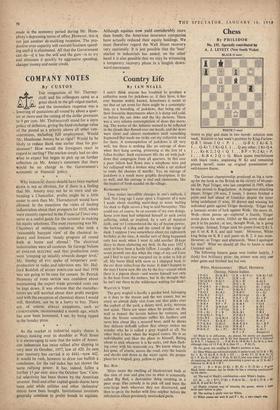COMPANY NOTES
By CUSTOS
THE resignation of Mr. Thorney- croft and his colleagues came as great shock to the gilt-edged market,
• and the immediate response was a lowering of quotations all round by about a quar- ter or more and the raising of the dollar premium to 9 per cent. Mr. Thorneycroft stood for a stern policy of deflation, giving the fixed exchange value of the pound as a priority above all other con- siderations, including full employment. Would Mr. Heathcoat Amory be as rigid? Would he be likely to reduce Bank rate earlier than his pre- decessor? How would the foreigners react in regard to sterling? The market simply had no idea what to expect but began to pick up on further reflection on Mr. Amory's statement that there would be no change in the Government's economic or financial policy.
Why industrial shares should have been marked down is not so obvious, for if there is a feeling that Mr. Amory may not be so stern and un- bending a Chancellor, profits might be a little easier to earn than Mr. Thorneycroft would have allowed. In the meantime the views of leading industrialists about their prospects for 1958, which were recently reported in the Financial Times may serve as a useful guide for the investor in making his equity selections. The most reassuring was Mr. Chambers of IMPERIAL CHEMICAL who took a 'reasonably buoyant view' of the chemical in- dustry and forecast 'steady progress all round both at home and abroad.' The electrical industrialists were all cautious. Sir George Nelson of ENGLISH ELECTRIC said that production costs were 'creeping up steadily tOwards danger level.' Mr. Stanley of PVC spoke of temporary over- production in radio and television sets. Mr. Hal- ford Reddish of RUGBY PORTLAND said that 1958 was not going to be easy for cement. Sir Patrick Hennessy of FORD MOTOR was confident about maintaining the export trade provided costs can be kept down. It was obvious that the manufac- turers are still worried about their profit margins and with the exception of chemical shares I would still, therefore, not be in a hurry to buy. There are, of course, always exceptions, such as CEMENTATION, recommended a month ago, which has now been honoured, I see, by being tipped in the Sunday press.
As the market in industrial equity shares is always looking over its shoulder at Wall Street it is encouraging to note that the index of Ameri- can industrials has twice rallied after dipping to very near its October, 1957, low of 420. Its new year recovery has carried it to 4441—now 442. It would be rash, however to draw too bullish a conclusion, for the rail index has not shown the same rallying power. It has, indeed, fallen a further 15 per cent. since the October low.' Care- ful selectivity has been shown by the American investor. Steel and other capital-goods shares have been sold while utilities and other 'defensive' shares have been bought. Institutional investors generally continue to prefer bonds to equities.


































 Previous page
Previous page